Made available on Serendip
In association with Making Sense of Diversity: An Exploration, a world wide conversation

|
March 31, 2006
Carolyn Lloyd and Courtney Moore
"Have You Heard... The BMC Gossip Mill and Other Challenges of Living in a Community of Women "
Participants
Summary
Prepared by Vanessa Christman
Additions, revisions, extensions are encouraged
in the
On-Line Forum
| 
|
“Have You Heard?. . . The BMC Gossip Mill and Other Challenges of Living in a Community of Women” was facilitated by senior Courtney Moore and Assistant Director of Residential Life Carolyn Lloyd, '99. Courtney started by focusing on communication at Bryn Mawr, inviting us to think about what aspects of it are confidential, and also to think about what it means to be a woman and a friend, especially in terms of sharing information. “Gossip is something we know about at Bryn Mawr,” she said.
Carolyn added that conversation here is hard to conceptualize. There are so many things that come to bear: it's a small campus and a women's campus, and aspects of technology (which are newer and were not a factor in Carolyn's time) play an enormous role. She brought up the issue of Facebook, asking the attendees how they experience that space. She also asked for comments on RSS feeds, which she uses to receive notices when a student blog has been updated.
The conversation began (but don't tell anyone you heard it from me):
One attendee said she's been aware since high school that others read what people write about you. Now, though, as another attendee pointed out, people write their own live journals—which seems exhibitionist.
“What is gossip?” someone asked. “It makes public things that are true,” was the answer. Someone disagreed, saying gossip is actually NOT TRUE.
Why do women gossip? We/they want to share, to be “helpful.” It's also a bonding exercise—we share information and feel tight, more connected. There's a sense that it's exclusive information. “We have this bond, and they're the outsiders,” is the feeling.
Why do we gossip online? After class, students are procrastinating, and “ you read your subscription—who broke up, who had a party. . .”
There's entertainment value in all this—live entertainment!—people break up in the middle of Erdman! One student said she thinks people don't mind being part of the gossip mill—especially if they are put on a live journal. She noted that there are good stories to be found there.
“It feels like a giant soap opera,” someone commented. But when we watch soap operas we're not personally connected. “What does all this other communication do to your actual relationships?” one of the group asked.
Roommates often assume they can share information.
With our roommates and friends, do we have to say every time, “I don't want you to talk about this?” ( Yes , the room answered.) “But,” someone noted, “I would trust my friends and value their discretion. That's part of how you choose your friends.”
Why do we gossip? What's the pay-off, the motivation?
- Something to talk about
- Storytelling impulse, but juicy stories can only safely be shared in a community where the main characters aren't known.
- It's a fact—“the community is going to know something eventually, so I may as well tell it.”
- There's a competitiveness to it.
- People think they're “just venting.” But sometimes it's slander!
- People will say they're telling something for the person's own good. That can be patronizing.
- There's drama in other people's stories.
- But—the fact it's a terrific story does not always justify the repeating of it. Some things are very private—e.g. if someone's been molested—you wouldn't tell that.
To gossip, or not to gossip—That is the question. And here's what attendees had to say on the topic:
“I was voted the biggest gossip in high school, which I took as a sign I needed to work on that. When I came here, I made the conscious effort to resist the impulse to gossip.”
“We never talked about anyone's business and never shared anything about ourselves either. It took me awhile to learn that not revealing feelings and information can be just as harmful to relationships as sharing too much.”
“I'm not a big gossip but I like to talk. I know people who are religiously observant—they're not to talk about people at all, because even starting to praise someone could lead to bad statements/intentions.”
How does being on this campus affect gossip-making?
- If you're dating—or in any situation—and having problems, where do you go? “All my friends know each other.”
- “I don't see much gossip—I have a small group of friends. But one of my friends does have a connection to the intricate dating scene. I don't know about that—
(“You're lucky,” someone interjected.)
- I thought the mill didn't exist either—it DOES exist, and it's really passive/aggressive.
- Someone said that she went to her HA about an issue, and her roommate was mad at her for talking to the HA instead of directly confronting her.
- “We're so geared to be passive/aggressive,” so confrontation hard. If confronted, some people shut down. What CAN you do if the shutdown occurs? (Advice follows at the end of this summary)
- Gossip exists because of the official confrontation thing. People “wait for the perfect Bryn Mawr Quaker thing to fall on them” for confrontation. They think, “—in the meantime, I'll gossip.”
- “After 3 years, my life is intertwined with everyone else's. But I came here looking for a small school—I'd rather have someone else in my business than to be lost in a huge school.”
- “I'm more chatty than my male colleagues and friends.”
- There was a negative situation in which students were talking about people off campus (people they knew from their Praxis course)—that was bad.
- —What if we just didn't tell other people's stories? But there's more drama in other people's stories.
What can you do to break the cycle?
There were a few ideas put on the table, but the attendees were still struggling with the whole process:
Whom do you go to when it seems like everyone's talking about such and such?
Counseling
Ask for a mediator
[Asking for help is hard. . . .]
Some people are not aware that what they're saying or doing is hurtful. The hurt party may need to say something.
You have to understand the individuals involved, too. One person's passive-aggression may be someone else's respect, restraint, discretion. What one person sees as Quaker confrontation/open engagement may leave another person feeling assaulted.
Honor board—“they've been trained, but what does training really mean if they're still another student? I'd rather go to an adult.”
“Adults gossip on this campus too. Something that happened recently was told to a group of students—that was inappropriate.”
“Do we have to feel like we've ‘failed' before we use these resources?” The skills we're talking about take training and practice. But there is a hesitation to approach those resources.
“But I screwed my own problems up by trying to solve them myself. Services exist to give a space to try to communicate in (and with) your best self.”
What can we do preemptively?
Do some people have the desire to be talked about? What kind of person do we want to be? Someone who's always talked about? What responsibility does the object of the gossip have?
Coming from diverse backgrounds, in terms of communication, makes it tricky.
We need balance when to share and not.
Carolyn closed the discussion by stating that she talks with customs people, mediators and HAs a lot about this issue. She recommended the following resources:
- Carolyn herself, in the Residential Life office in the Campus Center
- Reggie Jones, who was in attendance. She's the Director of Counseling at the Health Center. “You don't need to have a crisis [to come in],” Reggie noted. “[You may want to come in] to learn how to set boundaries, how to communicate.”
| Return to Schedule for Friday Noon Conversations

| Bryn Mawr Conversations
| Archived
Forum
| Archive of Bryn Mawr Conversation
| General Conversation
| Serendip Home |
These pages are sponsored by the Bryn Mawr College Office
of Intercultural Affairs, the Center for Science and Society and the Serendip
website. Send us additional comments or suggestions at Serendip
© by Serendip 1994-
- Last Modified:
Wednesday, 21-June-2005 15:18:00 EST

